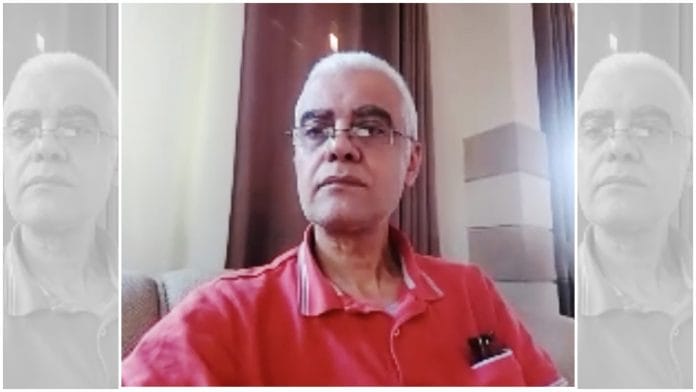New Delhi: In the early morning hours of 13 October, Naim Khatib, who resides in northern Gaza, found himself having to accept a difficult reality — abandoning his residence and moving to the middle of Gaza due to the constant Israeli airstrikes.
In a video interview to ThePrint in the midst of weak internet connectivity, Khatib said his neighbourhood has now been reduced to rubble. The tragedy did not end there for the retired government employee who now works as an independent consultant.
Within a few hours, Khatib learnt that 10 members from his extended family, who resided in Rafah, were killed in an airstrike. “Half of them were children, and the three-storey building that they were living in was razed to the ground. Their bodies were pulled out of the rubble,” he said, holding back his tears.
The Israeli army’s warning to the civilians to evacuate north Gaza would basically mean asking 1.1 million people to leave their homes behind and move to the south, he said.
Khatib remains suspicious of the warning and believes that most may not evacuate — since vacating may facilitate the Israeli army in its on-ground offensive.
As the roar of warplanes sounded in the background, the Gaza resident said that water, food and communication were scarce, due to Israel’s blockade on the basic necessities. While people are helping each other in solidarity, it is not the shortage of supplies that worries them, instead, it is the fear that grips them, he said from a temporary accommodation.
“There is no safe place in Gaza, one does not know where to go. Half a million people moved to take refuge in schools, but even that is not safe. So people keep moving, because the bombing gets intense by the minute.”
Khatib said the bombing was taking place as he speaks, but people were banned from showing the visuals by the de-facto government in Gaza for security.
Grieving friends and relatives are calling to check after knowing that a large part of his extended family has ceased to exist, he said.
“People in Gaza do not represent Hamas. I am not affiliated with Hamas. But the Israeli government is targeting everyone in Gaza, regardless of whether they are civilians or Hamas operatives. In actuality, Hamas members are not on the ground. They are well covered, unlike civilians. Even the international community (providing aid) in Gaza are being asked to evacuate,” said Khatib.
According to a Reuters report Wednesday, 11 workers with the U.N. Palestinian refugee agency were killed in Israeli air strikes on the Gaza strip since Saturday. Five members of the International Red Cross and Red Crescent were also killed in the conflict, it said.
For senior citizens like Khatib, the blame for the entire situation falls on the long-term Israeli occupation and denial of the Palestinian people of their rights. “You cannot oppress people and expect them to be submissive and peace loving. People in Gaza are not thirsty for blood,” he said.
Khatib recalled that his father was one among many who was forced to vacate his land “which was occupied” by Israel, and went on to accept the reality.
But in the existing moment, the Gaza resident remained almost certain that he would be killed any minute due to the bombings. “This morning, I asked people to forgive me. I sent some of my financial details to my daughter via email, who is abroad. This is because I expect myself to be killed any minute. There is no safe place in Gaza,” he recalled.
The existing Israeli regime never accepted or treated the people in Gaza as equal, nor did its predecessors abide by international humanitarian law and continued to violate them by killing civilians for “crimes that they did not commit”, he asserted.
“I have nothing to do with Hamas but the Israeli authorities’ daily provocation and incursions in the Al-Aqsa Mosque and beating up women cannot go unpunished. It accumulates hatred and does not allow room for peace,” Khatib said.
Heaving a sigh of disappointment, Khatib lamented that children were in large numbers among those killed in the past two days. In the past, he said, the Israeli army had some ethical high ground as it warned people before carrying out targeting their homes, but not anymore.
Seated on his chair, Khatib said that he does not “see the light at the end of the tunnel.” “I see continuous shelling and bombardment; I see death closing in on us. I hope at least the international community can uphold the international humanitarian law. We are asking for the right of life, not political solutions. We are worried about our own lives right now,” he said.
Khatib observed that the only choice left for the living was to keep relocating from one location to another. “Gaza will never be the same,” he said.
(Edited by Tony Rai)
Also Read: Israeli survivor says Hamas terrorists bombed families in their homes — ‘my friend burnt alive’






